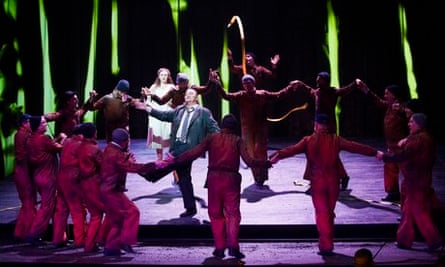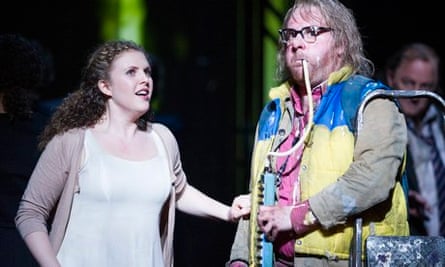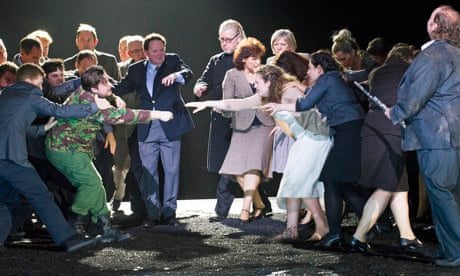Simon McBurney's staging is the first new Magic Flute at ENO for a quarter of a century. It comes to the Coliseum from the Netherlands Opera, yet it doesn't give any sense of being a show that has already been tested in a run of performances and fine-tuned accordingly; for a production that is effectively played out on a bare stage, with a platform that can rise and tilt as the only set, it seems very busy, even cluttered at times.
Much use is made of video, with captions and images created during the performance on a small blackboard at the side of the stage being projected onto gauzes in front of and behind the singers. However, like so many of the ideas, its use is sporadic, so that any consistency is lost. For once, the masonic imagery in Mozart and Schikaneder's pantomime is barely suggested, though McBurney does sometimes explore it as an Enlightenment allegory, and sometimes as a counterpart to Shakespeare's The Tempest, with quotations from the play infiltrating some of the dialogue.

Other elements seem to belong to a Peter Sellars-style updating to the present-day – James Cresswell's Sarastro as a TV evangelist, the Queen of Night's Three Ladies in army fatigues, Roland Wood's Papageno as a northern, working-class drop-out – but many are much harder to explain. Why are the Three Boys (renamed the Three Spirits here) emaciated and prematurely senile, for instance, why does Cornelia Götz's Queen of the Night first appear as a Viennese widow, and later become confined to a wheelchair, and why does Brian Galliford's Monostatos morph into some strange cross between Alberich and Gollum as the opera goes on? It's all put on stage with great theatricality and craft, but each idea seems isolated; nothing joins up, so that no coherent view of what this strange and puzzling work is all about can emerge.
What disappears, too, is most of the charm and humour of the piece, as well as much of the transcendent beauty of Mozart's score. The orchestra pit is raised almost to stage level, but that is the only period touch in Gergely Madaras's rather ordinary conducting. Much of the singing is routine, too; the best of it comes from Ben Johnson's bumbling Tamino and Devon Guthrie's statuesque Pamina, and it's left to Mary Bevan's Papagena in her one scene with Roland Wood's dour Papageno to remind us of the sparkle and fun The Magic Flute can provide.

In rep until 7 December. Box office: 020-7845 9300.
